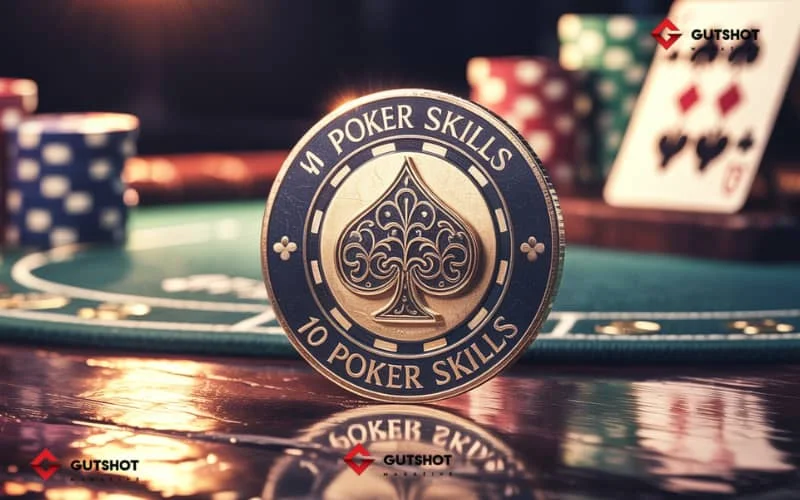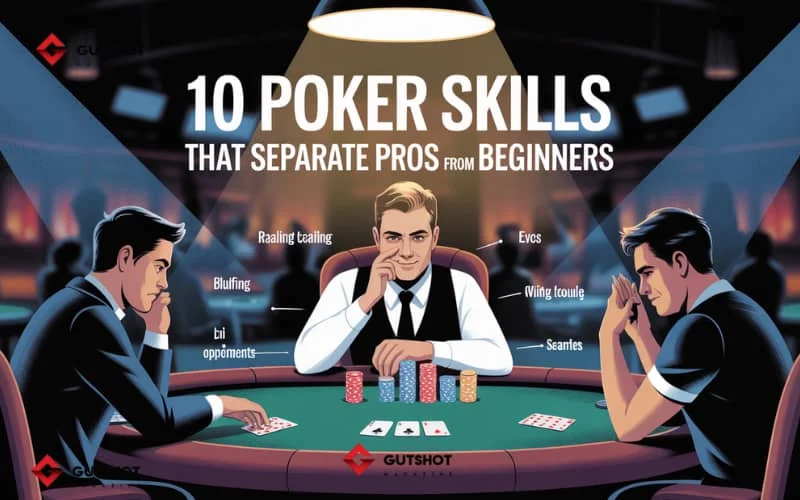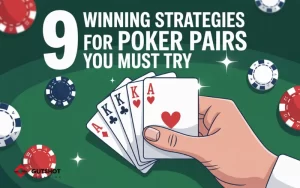Poker has always been one of the most popular card games in the world. It is not just about luck but about mastering certain poker skills that give players an edge at the table Gutshot. Professionals and beginners may sit at the same table, but their approach, strategies, and mindset make them entirely different. Understanding these poker skills can help any player progress from a novice level to a more advanced stage. Below are ten essential poker skills that separate pros from beginners.
Understanding Hand Reading
One of the most important poker skills is hand reading. Professionals do not just play their own cards; they carefully observe their opponents to estimate what hands they might have. Hand reading involves analyzing betting patterns, body language, and the flow of the game. Beginners often focus only on their own hands, while professionals consider the bigger picture, predicting possible combinations based on the cards on the table and the actions of their opponents.
Mastering Bluffing Techniques
Bluffing is a well-known part of poker, but only a few master it. Bluffing is not just about pretending to have a strong hand. It is about timing, psychology, and confidence. One of the poker skills professionals use is recognizing the right moment to bluff and against whom. Beginners often bluff too much or at the wrong time, which makes them predictable. A pro uses bluffing strategically, creating doubt in opponents’ minds while protecting their own strong hands.
Bankroll Management
Managing money effectively is one of the poker skills that separates long-term winners from short-term players. Professionals know exactly how much of their bankroll to risk in a game. They understand that variance is part of poker and that protecting their bankroll allows them to keep playing even during losing streaks. Beginners often risk too much money on a single game, hoping for a big win, which usually leads to losses and frustration.
Emotional Control
Another vital poker skill is emotional control, also known as avoiding tilt. Tilt happens when a player becomes frustrated or angry after losing a hand, causing them to play recklessly. Professionals remain calm, no matter the outcome of a hand. They focus on making the best decision each time rather than letting emotions drive their choices. Beginners often allow emotions to take over, leading to poor plays and bigger losses.
Positional Awareness
Understanding table position is one of the poker skills that pros use to their advantage. Being in a later position, such as on the button, allows a player to see how others act before making their own decision. Professionals adjust their strategies based on position, playing more aggressively when in a favorable spot and carefully when in an early position. Beginners often ignore position and play the same way regardless of where they are seated.
Analytical Thinking
Poker is a game of numbers, probabilities, and logic. Analytical thinking is one of the most important poker skills for professionals. They calculate pot odds, expected value, and probabilities before making decisions. This helps them decide whether to call, raise, or fold. Beginners, on the other hand, rely mostly on instinct or guesswork without fully understanding the math behind the game. Developing analytical skills gives players a significant advantage.
Patience and Discipline
Patience is one of the poker skills that professionals consistently demonstrate. They know not every hand is worth playing and are willing to fold weak cards without hesitation. Beginners often play too many hands, hoping for luck to carry them through. Discipline means sticking to a strategy even when tempted to make risky plays. Pros understand that winning in poker is about long-term consistency, not short-term luck.

Observational Skills
Great poker players are also great observers. Observation is a poker skill that allows pros to pick up on subtle patterns, such as how an opponent reacts when they have a strong hand versus a weak one. Body language, betting habits, and timing all give away valuable information. Beginners tend to focus only on their own cards and miss these important details. By sharpening observational skills, players can gain an extra edge.
Adaptability and Strategy Shifting
Adaptability is one of the poker skills that shows true professionalism. A strategy that works against one opponent might fail against another. Professionals constantly adjust their style of play depending on the dynamics of the table. They might play aggressively against passive players but more carefully against experienced ones. Beginners often stick to one strategy, making them predictable. Flexibility is what allows pros to outsmart opponents over time.
Risk Management and Decision Making
Poker involves taking risks, but professionals know how to manage them. One of the most advanced poker skills is making calculated decisions based on risk versus reward. Pros do not chase every pot; instead, they evaluate the chances of success before committing chips. Beginners often take unnecessary risks without fully considering the consequences. Smart risk management allows professionals to maximize winnings while minimizing losses.
Conclusion
Poker is more than just a game of chance. It is a strategic battle that requires discipline, focus, and skill. The poker skills mentioned above, such as hand reading, bluffing, bankroll management, and emotional control, highlight the difference between a beginner and a professional. While beginners may rely on luck, professionals use these skills to stay consistent and profitable over time. By practicing patience, observation, and adaptability, any player can improve and move closer to playing like a pro. Ultimately, mastering these poker skills is what separates casual players from champions.









